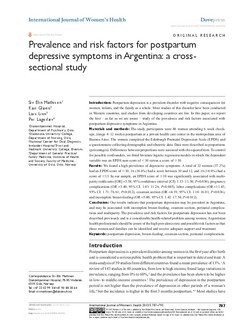Prevalence and risk factors for postpartum depressive symptoms in Argentina: a cross-sectional study
Journal article, Peer reviewed
Permanent lenke
http://hdl.handle.net/11250/134648Utgivelsesdato
2013Metadata
Vis full innførselSamlinger
Originalversjon
Mathisen, S.E., Glavin, K., Lien, L. & Lagerkløv, P. (2013). Prevalence and risk factors for postpartum depressive symptoms in Argentina: a cross-sectional study. International Journal of Women's Health 5, 787-793. http://dx.doi.org/10.2147/IJWH.S51436Sammendrag
Introduction: Postpartum depression is a prevalent disorder with negative consequences for women, infants, and the family as a whole. Most studies of this disorder have been conducted in Western countries, and studies from developing countries are few. In this paper, we report the first – as far as we are aware – study of the prevalence and risk factors associated with postpartum depressive symptoms in Argentina.
Materials and methods: The study participants were 86 women attending 6 week check-ups, (range 4–12 weeks) postpartum at a private health care center in the metropolitan area of Buenos Aires. The women completed the Edinburgh Postnatal Depression Scale (EPDS) and a questionnaire collecting demographic and obstetric data. Data were described as proportions (percentages). Differences between proportions were assessed with chi-squared tests. To control for possible confounders, we fitted bivariate logistic regression models in which the dependent variable was an EPDS sum score of ,10 versus a score of $10.
Results: We found a high prevalence of depressive symptoms. A total of 32 women (37.2%) had an EPDS score of $10, 16 (18.6%) had a score between 10 and 12, and 16 (18.6%) had a score of $13. In our sample, an EPDS score of $10 was significantly associated with multiparity (odds ratio [OR] =3.58; 95% confidence interval [CI]: 1.13–11.30; P=0.030), pregnancy complications (OR =3.40; 95% CI: 1.03–11.26; P=0.045), labor complications (OR =11.43; 95% CI: 1.71–76.61; P=0.012), cesarean section (OR =4.19; 95% CI: 1.10–16.01; P=0.036), and incomplete breast-feeding (OR =5.00; 95% CI: 1.42–17.54; P=0.012).
Conclusion: Our results indicate that postpartum depression may be prevalent in Argentina, and may be associated with incomplete breast-feeding, cesarean section, perinatal complications and multiparity. The prevalence and risk factors for postpartum depression has not been described previously and is a considerable health-related problem among women. Argentinian health professionals should be aware of the high prevalence rate and possible risk factors so that these women and families can be identified and receive adequate support and treatment.
Keywords: postpartum depression, breast-feeding, cesarean section, perinatal complications
Beskrivelse
Vitenskapelig, fagfellevurdert artikkel
